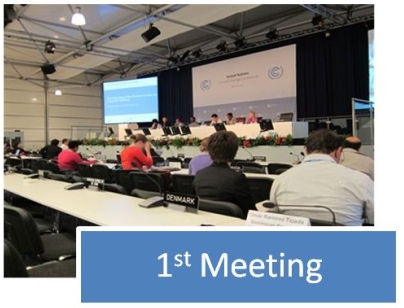
The inaugural meeting of the Durban Forum on Capacity-building was one of the highlights of the Bonn Climate Change Conference in May 2012. It gave voice to more than 200 participants from diverse backgrounds who came together to share experiences and good practices in building the capacity of developing countries to respond to climate change.
Held during two afternoon sessions, the Durban Forum shed light on the work that has been happening on the ground and the challenges that lay ahead. People from governments, youth groups, intergovernmental and non-governmental organizations, the private sector, the United Nations and academia took to the stage to tell their stories, signalling a shift to a more holistic way of tackling capacity-building. In the spirit of inclusiveness, the meeting was webcast so that anyone, anywhere, could join in.
The meeting was structured around 17 presentations under six headings. Following each session, the floor was opened up to questions. Throughout the meeting, participants were reminded that capacity-building is a complex issue but, at its core, it is a human issue. Two often-repeated themes were ‘snowball effect’ and ‘country-driven action.’ Participants and presenters spoke about the need to create a snowball effect, whereby capacity-building action builds on itself, becoming larger and more effective as it goes. The second theme, country-driven action, referred to the importance of building the right project in the right place, led by local communities and for local communities. For more detailed information, read the summary report of the meeting here.
First meeting of the Durban Forum on Capacity-building: a close-up overview
Day 1: Tuesday, 22 May 2012 (15:00-18:00)
Following opening remarks from UNFCCC Executive Secretary Christiana Figueres and SBI Chair Mr. Tomasz Chruszczow, representatives from Parties, NGOs, youth organizations, United Nations organizations, the private sector and academia took to the stage to share experiences and identify needs and gaps in the delivery of capacity-building for adaptation and mitigation.
The audience was eager to participate in the discussion, asking targeted questions on how to better enhance capacity-building in developing countries.
H.E. Ms. Dessima Williams (Grenada) and Mr. Maas Groote (The Netherlands), who acted as co-chairs, directed the discussion component of the Forum, fielding questions from the audience and summarizing issues in a clear and compelling way.
Day 2: Wednesday, 23 May 2012 (15:00-18:00)
The well-received presentations of the first day continued on Wednesday with a focus on technology, financial support and the issue of monitoring and review of the effectiveness of capacity-building, the latter being mandated in decision 2/CP.17.
Two often-repeated themes during the second day were “snowball effect” and “country-driven action.” Participants and presenters spoke about the need to create a snowball effect, whereby capacity-building action builds on itself, becoming larger and more effective as it goes. The second theme, country-driven action, referred to the importance of building the right project in the right place, led by local communities, for local communities.
The session on monitoring and review was characterized by a lengthy debate on the effectiveness of quantitative vs. qualitative indicators when monitoring and reviewing capacity-building projects.
The first meeting of the Durban Forum on capacity-building concluded with closing remarks by SBI Chair Mr. Chruszczow, who hailed the Forum as a success in terms of the importance of the issues raised, the quality of the presentations and the engaged debate which followed.
For a complete overview of the first meeting of the Durban Forum, you can consult the agenda (181 kB) , the presentations by panelists, and the webcasts of Day 1 and Day 2.
